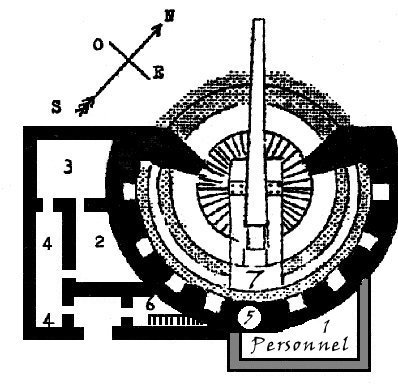In
1: the housing of the personnel.
In Room 2
and Room 3: the poudrière
who could contain 10 tons of powder where were stored the
cartridges (Room 3), and
the arsenal where the shells (Room
2) were stored. Some good caricatures of Winston
Churchill, drawn by an
artist of the German army, are still visible there. One saw,
in 1945, a table of shooting traced on the wall which gave,
by a succession of features, the number of drawn blows. All
is erased, except a swastika held in the greenhouses of the
Hitlérien eagle, with the German inscription: "each
one will break, Germany will remain".
In Room 4:
site of the power generating unit ensuring lighting and the
driving force necessary to the displacement of the mounting
and from where the ammunition were conveyed.The painter created
a flag of horn-the eye.
In 5: a steel cupola, 10 cm thickness made
it possible to supervise the surroundings.
In Room 6:
a hall leads on the one hand, by a staircase now blocked,
with the basement; in addition with the large circular shelter
which sheltered the gun. The large concrete cone on which
the pivot retaining was sealed the mounting, is still in perfect
state.
In Room 7:
swivelling on rails, the gun could move of 52 height and of
more than 90 in width.
|
